How to Rank Higher in AI Search Engines like Google and Bing?
AI search engines have transformed how companies handle their online presence. Staying updated in today’s rapidly changing world can seem like an ongoing struggle. However, companies can easily track trends and data with AI tools to stay updated.
Artificial intelligence (AI) has transformed search engine technology by giving more accurate and precise search results. According to SeoProfy, AI-powered SEO campaigns can increase organic traffic by 45% and conversion rates by 38% for e-commerce businesses.
Thus, organizations must adapt their approach within the next several years thanks to new advancements, such as Google’s BERT and MUM models. In this article, we will explore how AI has affected search engines and guide you on how to rank in the AI search engines in 2025.
Evolution of AI Search Engines
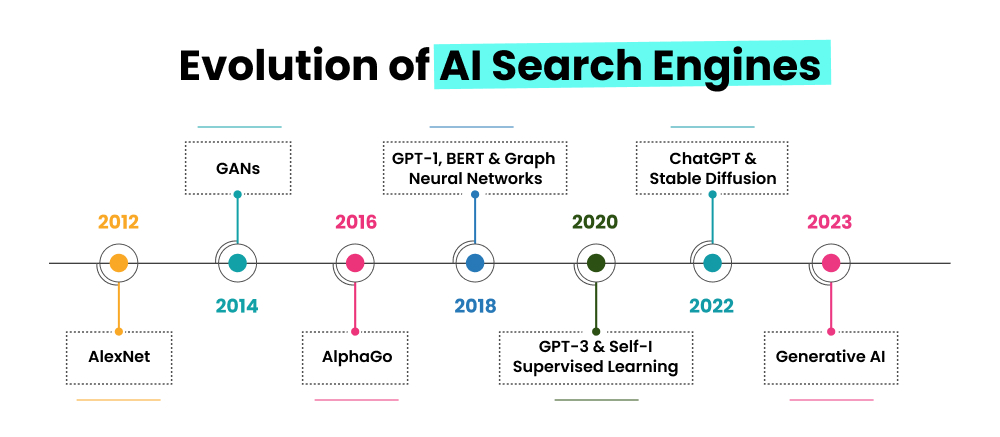
When the search engine had no use for AI, it responded using simple keyword matching and rules of thumb. Search engines have also become much smarter with the progress of artificial intelligence (AI), particularly in natural language processing and machine learning.
1. Modern AI search engines like Google and Bing can explain, understand intention, and determine meaning not just from the language of a query but also from a user’s request. This enables them to deliver more accurate and relevant results.
For example –
Google uses advanced AI tools like BERT (Bidirectional Encoder Representations from Transformers) and MUM (Multitask Unified Model).
BERT helps search engines understand what it means when someone types in awkward English questions — in a manner that people would normally speak. Then search engines can give a true answer to those received questions.
However, MUM takes a further step in multiple formats such as text, images, and videos to present full results, enabling more simple and insightful searching.
2. Personalization is another big improvement in which AI analyzes your behavior, preferences, and location. This further customizes your search results and gives you a more personalized experience. Today, search engines do more than search for information. They act as intelligent assistants that predict your needs and make searching faster and easier.
Also Read: 5 Effective Tips to Optimize Your Google Ads Campaigns for Better Conversions
1. SEO Strategies for AI Search Engines in 2025
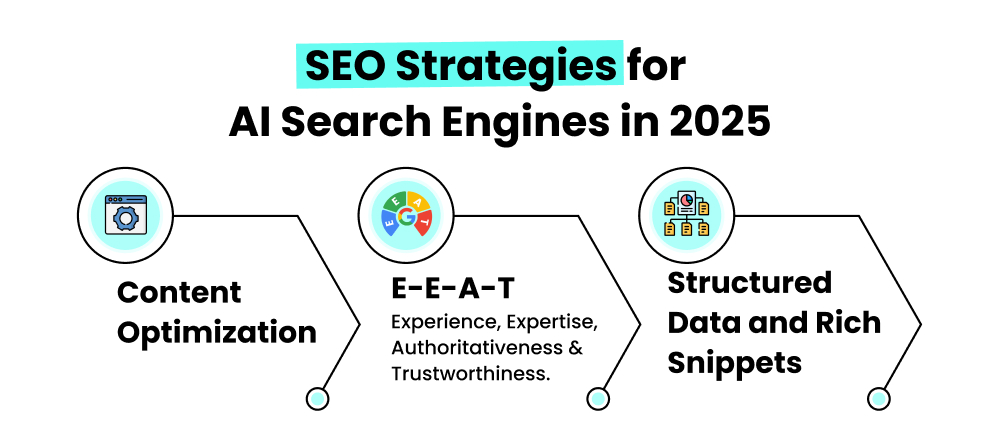
Below are some of the top SEO tips that can be used in ranking higher in 2025 with AI search engines. Also, some practical tips are mentioned below to help you stay updated and ahead of the competition.
Content Optimization
One of the most important strategies of SEO in 2025 is content optimization, and with the help of AI tools, it is even more possible. Tools for SEO based on artificial intelligence (AI), such as Clearscope, SEMrush, and Frase, utilize NLP (Natural Language Processing) to search for valuable keywords. These tools also provide recommendations for optimizing your content.
These tools look into search trends, user/traffic behavior, and what competitors are up to, providing actionable insights to help you craft engaging and reflective content.
To create user-focused and quality content look at the following SEO strategies for AI search engines:
- Understanding User Intentions: Try searching for what your audience is looking for. For example, if they search for “budget laptops,” ensure your content covers affordability, specifications, and comparisons.
- Keep It Readable: Use straightforward language, break your content into shorter paragraphs, and add subheadings to improve readability.
- Use Multimedia: Include videos, images, and infographics. AI search engines favor content that includes these elements, which keep users engaged.
- Update Regularly: Re-update your content to keep it relevant. It will signal to search engines that your website is active and consistently maintained.
Note: AI tools can also provide an option to know how to make your content voice and visual search-friendly for flexibility.
E-E-A-T
Google’s E-E-A-T principles are important in terms of increasing credibility as well as rank. E-E-A-T means – Experience, Expertise, Authority, and Trustworthiness. Here’s how you can apply these principles:
- Experience: Share practical knowledge through tutorials or case studies.
- Expertise: Show your authority on the subject with thorough articles, certifications, or expert collaborations.
- Authority: By increasing the authority of your website you can acquire backlinks from reputable websites and collaborate with trusted brands.
- Trustworthiness: Be transparent through secure website protocols and clear privacy policies.
Also Read: A to Z of Amazon Marketing in 2025 (Trends, SEO, Updates, and Strategies to Succeed)
Structured Data and Rich Snippets
Structured data, such as schema markup, helps AI algorithms categorize and interpret your content more effectively. Well, schema markup is a type of code added to your website that allows search engines to understand and extract more information from your website. Implementing schema is a major aspect of AI-powered SEO and it can:
- Improve search visibility by generating rich snippets, like FAQs, star ratings, and product details.
- Improve click-through rates by providing users with immediate, valuable information.
- Help search engines understand the relationship between different elements on your website.
For example, an e-commerce site selling smartphones can use structured data to highlight prices, availability, and customer reviews in search results. This attracts clicks and indicates to search engines that the content is precise and relevant.
2. Integrating AI in Search Engine Marketing (SEM)
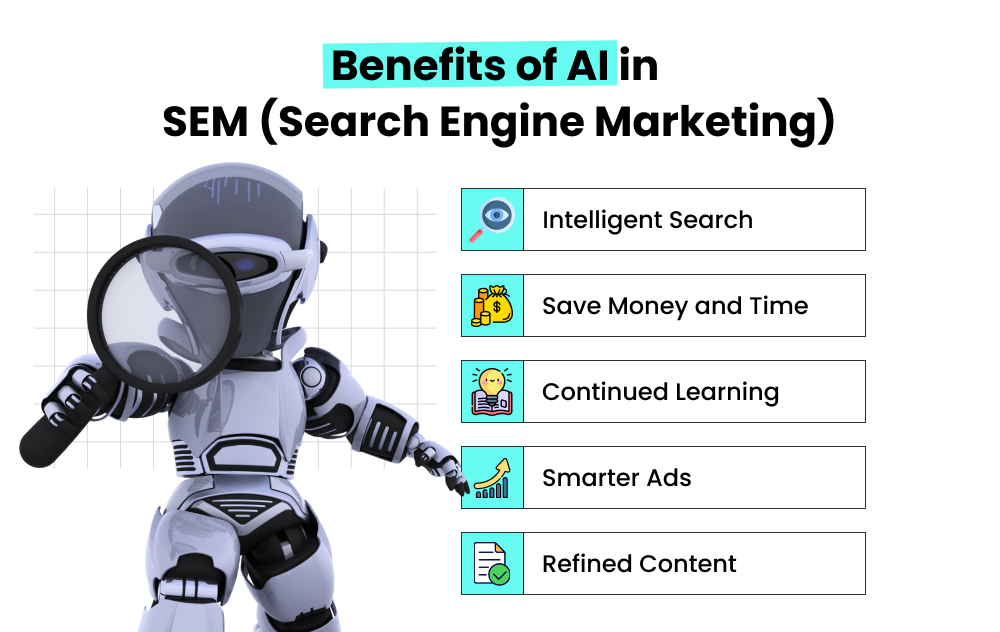
The entry of artificial intelligence in Search Engine Marketing (SEM) is becoming more advanced as businesses can improve their campaigns. SEM strategies are improved with the use of AI-powered tools that process large quantities of data.
For example, AI-based smart bidding tactics in Google ads automatically modify bids in real-time. This allows ads to be displayed at the right moment and for the optimal target group. This leads to better ad placement and higher ROI. AI also analyzes user activity patterns, such as browsing histories and search queries, to find the most effective approach to target potential customers.
Another benefit of AI in SEM is ad personalization. AI personalizes ads based on the user’s choices, increasing the possibility of conversion.
For example, an online clothes company may use AI to show seasonal discounts or personalized product recommendations in their advertisements.
Case studies have also demonstrated that companies that use AI-based SEM tools have improved click-through rates and sales. By analyzing real-time data, AI improves ad targeting so that marketing expenses are used more efficiently.
To stay updated in 2025, businesses must integrate AI tools into their SEM strategies. It not only increases visibility but also makes sure that campaigns are optimized for maximum efficiency.
Also Read: How Amazon’s AI-Powered Rufus is Revolutionizing Shopping and Marketing
3. Voice and Visual Search Optimization
Voice and visual search are developing how users engage with search engines. To optimize for voice, create conversational content that answers natural-language queries. For example, focus on phrases like “Where can I find organic groceries near me?” and create pages with frequently asked questions (FAQs) to boost voice search traffic.
For visual search, optimize image metadata, use descriptive alt texts, and ensure high-quality images. Platforms like Pinterest Lens and Google Lens are driving this trend, making it crucial to match content with visual search. Retail brands that utilize visual search have seen a massive boost in traffic, which shows the importance of voice and visual optimization.
4. Local and Mobile SEO in AI Search Engines
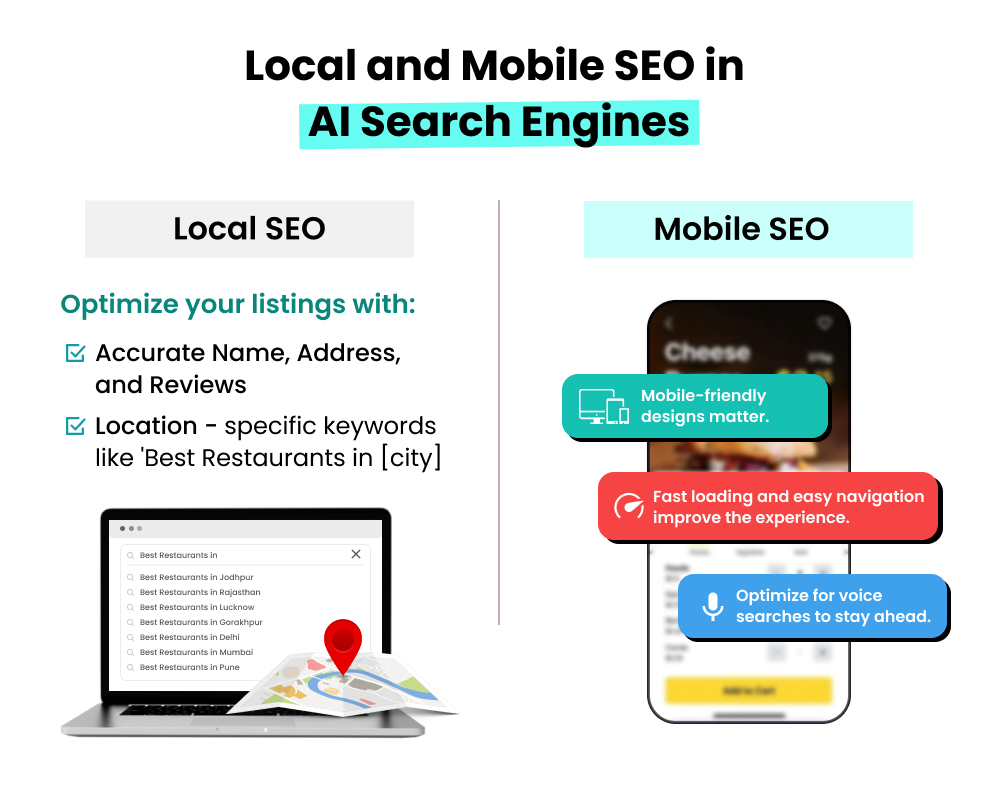
Local and mobile SEO are essential for success in AI search engines since they both focus on producing regional and device-specific results. Local search optimization is achieved by updating business listings, including location-specific phrases, and gathering positive reviews from customers.
For example, adding phrases like “best restaurants in [city]” can help you attract more local customers.
Websites should be flexible being a part of mobile-first indexing. This involves responsive designs, fast loading times, and easy navigation to improve user experience on smaller screens.
AI search engines also analyze mobile behavior to deliver specific results, such as location-based recommendations or voice-activated searches. By focusing on local and mobile optimization, you can easily increase visibility, drive foot traffic, and stay relevant in an increasingly mobile and AI-driven search environment.
5. Monitoring and Analytics
If you feel you can challenge other sites in the world of search engines that use AI, then you need to track your site’s performance first. Fortunately, there are some existing tools through which it is possible to gather real-time data on what users are doing on your website.
For example –
With Google Analytics and SEMrush, you can track time and observe how many visitors stay on your site, and who left the page right after opening. These tools will also assist you in determining the ratio of who proceeds to buy a product or subscribe to a service. This way you can have at least an idea of how your site is performing.
Also Read: 7 Proven Ad Retargeting Strategies to Optimize Your Campaign Performance
Practical Tips to Improve AI Search Rankings
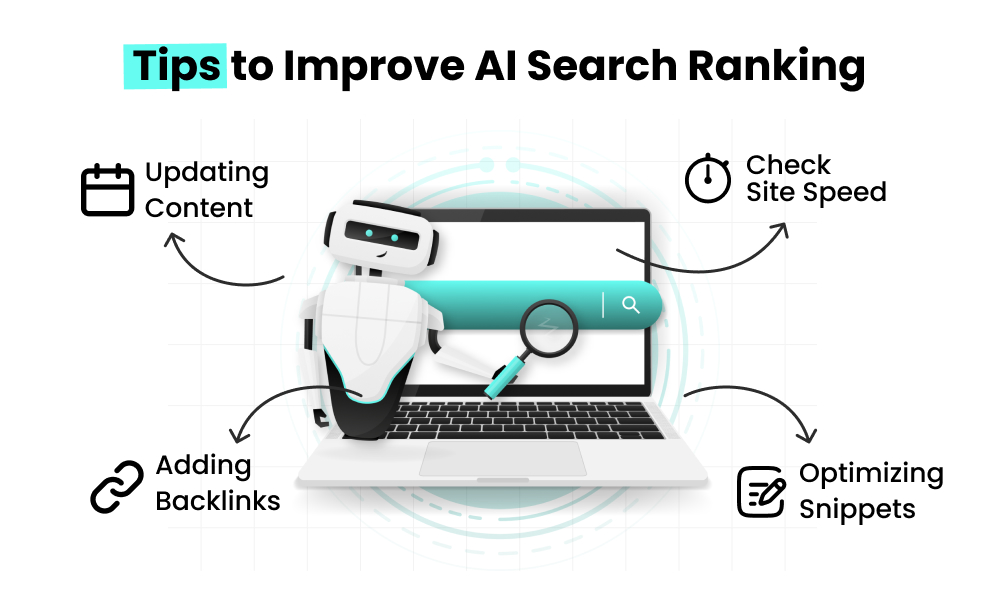
Here are some practical tips you need to improve AI search rankings. These steps ensure that your content aligns with AI’s advanced algorithms:
- Improve your AI search rankings by consistently updating content with fresh and helpful information.
- Improve site speed with tools like Google PageSpeed Insights, as loading time impacts rankings.
- Adopt ethical link-building practices by partnering with credible sources and creating shareable content.
- Additionally, optimize for featured snippets by structuring content clearly, such as bullet points and headings.
Conclusion
To improve online presence and rankings, businesses should focus on important strategies like improving their website content and using clear, organized information. Additionally, they should focus on improving their visibility in local searches and on mobile devices.
As we move further in 2025, the key to success will be adopting the potential of artificial intelligence (AI). Staying informed about the latest developments, and consistently providing valuable experiences for users will also be crucial.
By executing these approaches, you can achieve better search rankings but also create strong, lasting relationships with your audience in a rapidly changing environment.
